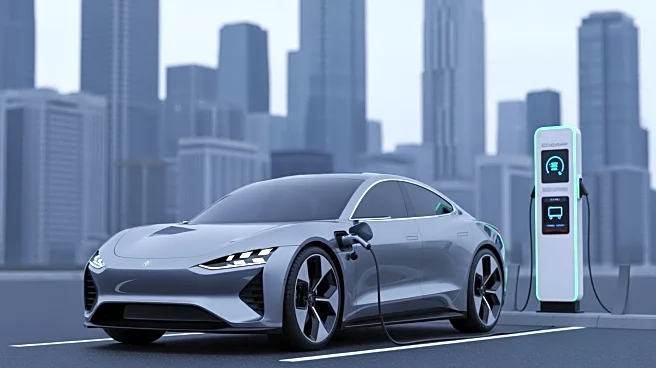What's Happening?
The U.S. electric vehicle market experienced significant growth in the third quarter of 2025, with sales increasing by 27% year over year, amounting to nearly 100,000 additional units sold. This surge follows a broader trend of rising EV sales, driven
in part by the impending expiration of the EV tax credit, which prompted consumers to purchase vehicles before the deadline. Compared to previous years, sales have shown remarkable growth: up 41% from Q3 2023, 113% from Q3 2022, and 256% from Q3 2021. Tesla continues to dominate the market, with the Model Y leading sales at 114,897 units, followed by the Model 3 at 53,857 units. Other notable performers include the Chevrolet Equinox EV, Honda Prologue, Hyundai IONIQ 5, and Ford Mustang Mach-E. Despite the overall positive trend, some models, such as the Tesla Model S and Rivian R1T, saw declines in sales.
Why It's Important?
The surge in electric vehicle sales underscores a significant shift in consumer preferences towards more sustainable transportation options. This trend is crucial for the automotive industry as it adapts to changing regulations and consumer demands for environmentally friendly vehicles. The growth in EV sales also highlights the impact of government incentives, such as tax credits, on market dynamics. Tesla's continued dominance in the EV sector reinforces its position as a leader in innovation and market share, while other manufacturers are gaining ground, indicating increased competition. The expansion of EV sales contributes to the reduction of carbon emissions and supports the transition to cleaner energy sources, aligning with broader environmental goals.
What's Next?
As the EV market continues to expand, manufacturers are likely to increase production to meet growing demand. The expiration of the EV tax credit may lead to short-term fluctuations in sales, but long-term growth is expected as more consumers adopt electric vehicles. Automakers may focus on developing new models and technologies to enhance performance and affordability, further driving market competition. Additionally, infrastructure improvements, such as the expansion of charging networks, will be essential to support the increasing number of EVs on the road. Policymakers may consider new incentives or regulations to sustain the momentum in EV adoption and address environmental concerns.
Beyond the Headlines
The rise in EV sales reflects broader societal shifts towards sustainability and environmental consciousness. As electric vehicles become more mainstream, they may influence urban planning and transportation policies, promoting cleaner cities and reducing reliance on fossil fuels. The automotive industry's transition to electric vehicles could also impact employment, with potential shifts in job opportunities from traditional manufacturing to EV-related sectors. Ethical considerations, such as the sourcing of materials for batteries, may become more prominent as the industry grows, prompting discussions on responsible production practices.


















